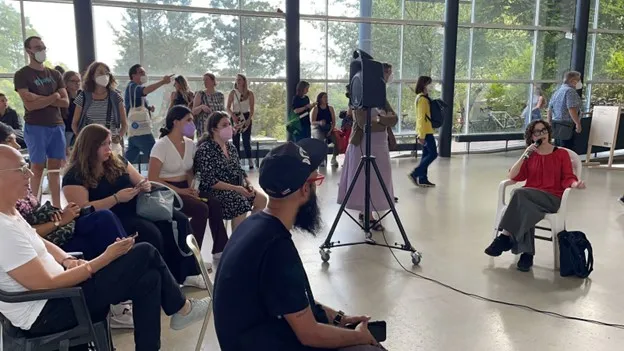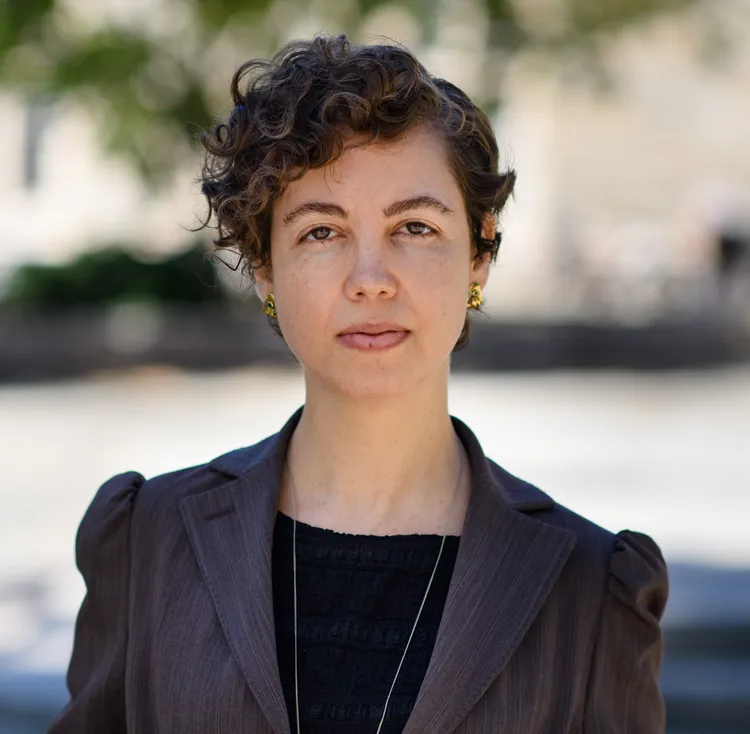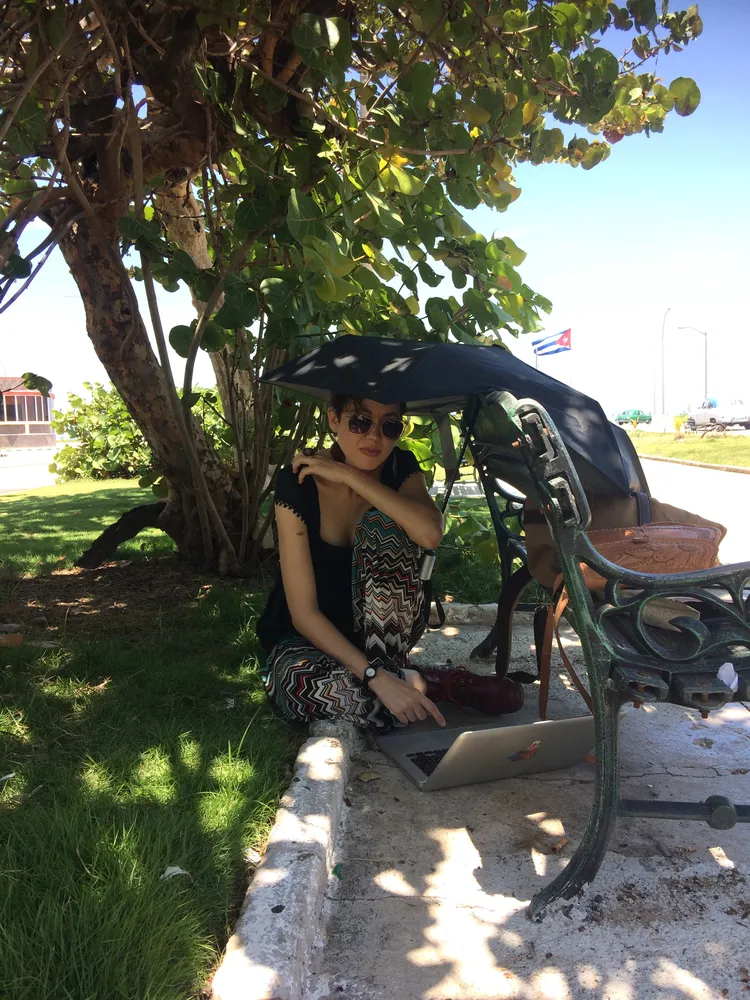Digital Media and Literature in Cuba
15 November 2022
CDH Dissertation Prize co-winner Lizabel Mónica *22 analyzed how writers used digital media in publishing their works, but also how digital media influenced authors and Cuban literature.

Every year, the Center for Digital Humanities recognizes exceptional doctoral work by Princeton PhDs whose dissertation includes a digital humanities component. The co-winner of the 2021 CDH Dissertation Prize is Lizabel Mónica *22 (Spanish and Portuguese).
Lizabel’s project, Literatura por otros medios: Tecnología digital y campo literario en la Cuba contemporánea, was grounded in methodologies and questions regarding digital humanities. “My dissertation examines the legacies of a digital paradigm in the field of literature in Cuba,” Lizabel said. “I explore how digital technologies are modifying the relationship between producers and consumers of literature in 21st-century Cuba.”

Lizabel is one of two co-winners of the 2021 CDH Dissertation Prize.
In specific, Lizabel analyzed how writers used digital media in publishing their works, but also how digital media influenced authors and Cuban literature. “The main finding of my dissertation is that the use of digital technologies has transformed the relationship between art producers and consumers in Cuba, and these new dynamics are shaping the artworks. Before technology and during the Revolution, this relationship was entirely mediated by the State. Today, on the contrary, producers and consumers can interact directly with each other. Now, it has also changed who is the producer and who is the consumer, and I found that in literature, both producers and consumers are writers themselves.”
Lizabel had extensive experience leading up to her PhD at Princeton, which gave her insights to the questions she was interested in answering. She worked as a writer at an independent Havana-based digital editor in the early 2000s. “Those circumstances led me to become a native informant and serve as an island source for scholars from abroad,” she said. “From 2010 to 2012 I was invited to give talks and lectures in several universities in the United States. As a cultural producer for these events, I collected, analyzed, and curated a vast range of Cuban artworks.”
For her PhD research, Lizabel traveled to Cuba three times (in 2014, 2015, and 2016), through grants supported by the Program in Latin American Studies (PLAS). While in Cuba, Lizabel conducted ethnographic research to study “the impact of new media on the work of writers and artists living in Cuba today.”
Lizabel was mindful for the challenges of conducting research in Cuba. “Cuba is known for both its limited access to the internet and for its pioneering digital culture,” Lizabel said, “But my main challenges were related to the divisive politics that reign in the Cuban cultural field. Because my work is not only about doing research but also about making contributions or interventions, I have to ethically navigate the complexities of the island when presenting there, publishing anything on social media, or working with artists and writers living in Cuba,” she said. “Additionally, part of that ethic is to respect the opinions of those that think differently from me. Fortunately, I believe that Cuba and its diaspora is a sphere where you can still find people with ideological differences sharing space and discussing the confluences and disagreements of their political visions.”

Lizabel accessing the internet from a public park in Havana in 2019.
When she returned to Princeton in 2017, she realized that she needed help managing the archival portion of her research. She reached out to former CDH postdoc Nora C. Benedict, who helped answer Lizabel’s questions and helped Lizabel develop resources to showcase her findings. “Nora C. Benedict was critical in my development of the online collection Digital Entanglements, a repository and virtual exhibition space for Cuban-born digital cultural products,” Lizabel said.
In conducting and analyzing her research, Lizabel used a variety of methodologies. “I used general approaches based on ethnography, but also methods that are specific to a variety of research goals, like textual analysis and social media analysis,” she said. She realized that she would use digital humanities methods after examining her data and “when looking for a research approach that could serve this data in the most productive way, both because of the nature of the data (which was mostly digital) and the possibilities that such data could offer in analytical terms,” she said.
Lizabel processed the data she collected via a process she calls deformational reading. “Deformational reading is a methodological protocol that I created by developing an approach originally proposed by Alan Liu and Bruno Latour,” she explained. “I agree with Liu that today the document or the file is the main form for every cultural product. However, I also think we should acknowledge the fluid, digitally-based, materiality of the text. It is important to work on a methodology that integrates qualitative and quantitative research by deforming the artificial boundaries of what Bruno Latour calls macro and micro phenomena. My approach deforms the idea of the fixed physical book as the ultimate literary product. Instead of the book, I study the document. It is my opinion that the document is the best starting point to understand the aesthetic and social processes involved in the production of the literary text.”
Lizabel’s advisor, Dr. Rachel Price (Spanish and Portuguese), was impressed by her use of quantitative and qualitative research. “Lizabel’s dissertation is cutting-edge and archivally rich,” she said. “It examines both quantitatively and qualitatively how Cuban literature and adjacent cultural production has responded to the emergence of digital supports, logics, platforms, and politics in the past two decades.”
Dr. Price recommended Lizabel for the dissertation prize because of Lizabel’s ability to “ably connect writerly production to intersecting and adjacent fields of digital culture. As a young author, blogger, critic, and artist, Lizabel was long interested in the new genres and collectivities that digital media facilitates; she investigated this question from both creative and theoretical perspectives.”
After graduating with her doctorate, Lizabel is now looking for ways to expand her dissertation “not just in the literary field, but also with visual arts and music.” She has started a collaborative project with activist and musician Damarys Benavides in Havana called Fruta Bomba, which is “devoted to activism and music and focused on girls and women.” She also plans to publish her dissertation as a book.
For current students considering using DH in their dissertation projects, Lizabel recommends simplicity. “Go back, as frequently as you can, to those basic questions that ground your work. What am I doing? Why am I doing it? Or, in other words: how is my use of DH tools helpful to my research?”
She also recommends taking a break from academic conversations and re-entering the “real world. From that vantage point, you will be able to reassess a more straightforward goal: to make a contribution.”
Carousel image: Lizabel presents “¡Connected! The independent media and the cultural field,” INSTAR square, Documenta Fifteen, Germany, Kassel, August 7, 2022
Last week, we published a piece about CDH Dissertation Prize co-winner Kristen Starkowski *21. Read more about Kristen’s work.